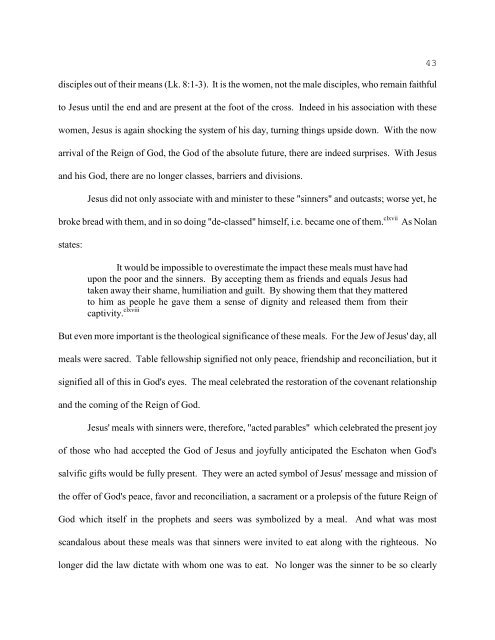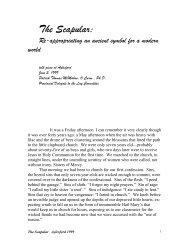Christocentrism of Charism – Buggert - CarmelStream
Christocentrism of Charism – Buggert - CarmelStream
Christocentrism of Charism – Buggert - CarmelStream
You also want an ePaper? Increase the reach of your titles
YUMPU automatically turns print PDFs into web optimized ePapers that Google loves.
disciples out <strong>of</strong> their means (Lk. 8:1-3). It is the women, not the male disciples, who remain faithful<br />
to Jesus until the end and are present at the foot <strong>of</strong> the cross. Indeed in his association with these<br />
women, Jesus is again shocking the system <strong>of</strong> his day, turning things upside down. With the now<br />
arrival <strong>of</strong> the Reign <strong>of</strong> God, the God <strong>of</strong> the absolute future, there are indeed surprises. With Jesus<br />
and his God, there are no longer classes, barriers and divisions.<br />
Jesus did not only associate with and minister to these "sinners" and outcasts; worse yet, he<br />
broke bread with them, and in so doing "de-classed" himself, i.e. became one <strong>of</strong> them. clxvii As Nolan<br />
states:<br />
It would be impossible to overestimate the impact these meals must have had<br />
upon the poor and the sinners. By accepting them as friends and equals Jesus had<br />
taken away their shame, humiliation and guilt. By showing them that they mattered<br />
to him as people he gave them a sense <strong>of</strong> dignity and released them from their<br />
captivity. clxviii<br />
But even more important is the theological significance <strong>of</strong> these meals. For the Jew <strong>of</strong> Jesus' day, all<br />
meals were sacred. Table fellowship signified not only peace, friendship and reconciliation, but it<br />
signified all <strong>of</strong> this in God's eyes. The meal celebrated the restoration <strong>of</strong> the covenant relationship<br />
and the coming <strong>of</strong> the Reign <strong>of</strong> God.<br />
Jesus' meals with sinners were, therefore, "acted parables" which celebrated the present joy<br />
<strong>of</strong> those who had accepted the God <strong>of</strong> Jesus and joyfully anticipated the Eschaton when God's<br />
salvific gifts would be fully present. They were an acted symbol <strong>of</strong> Jesus' message and mission <strong>of</strong><br />
the <strong>of</strong>fer <strong>of</strong> God's peace, favor and reconciliation, a sacrament or a prolepsis <strong>of</strong> the future Reign <strong>of</strong><br />
God which itself in the prophets and seers was symbolized by a meal. And what was most<br />
scandalous about these meals was that sinners were invited to eat along with the righteous. No<br />
longer did the law dictate with whom one was to eat. No longer was the sinner to be so clearly<br />
43



